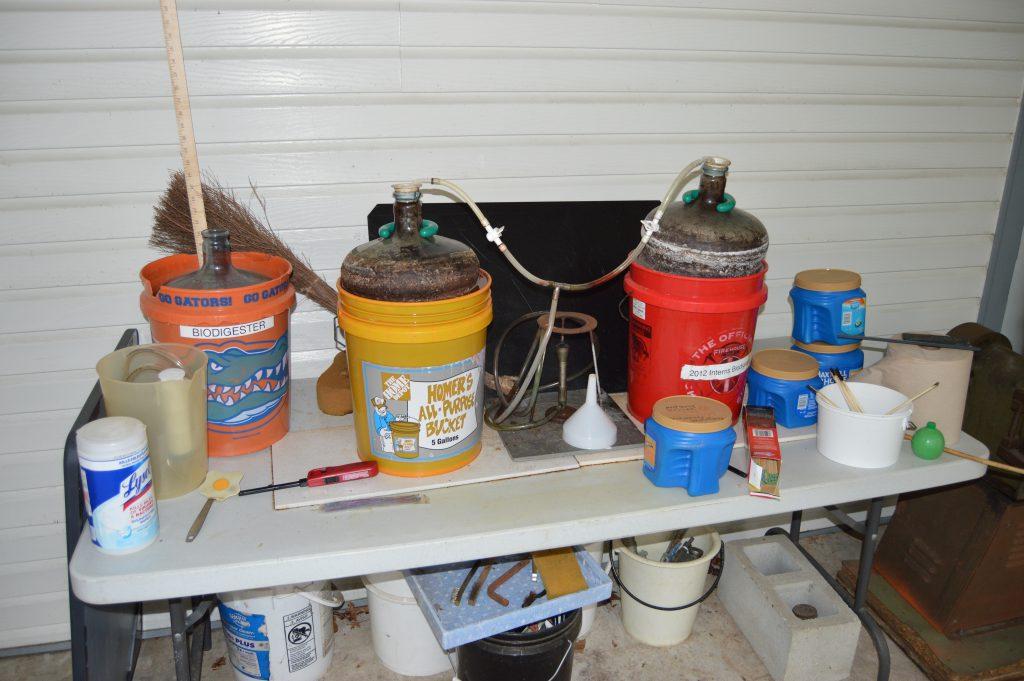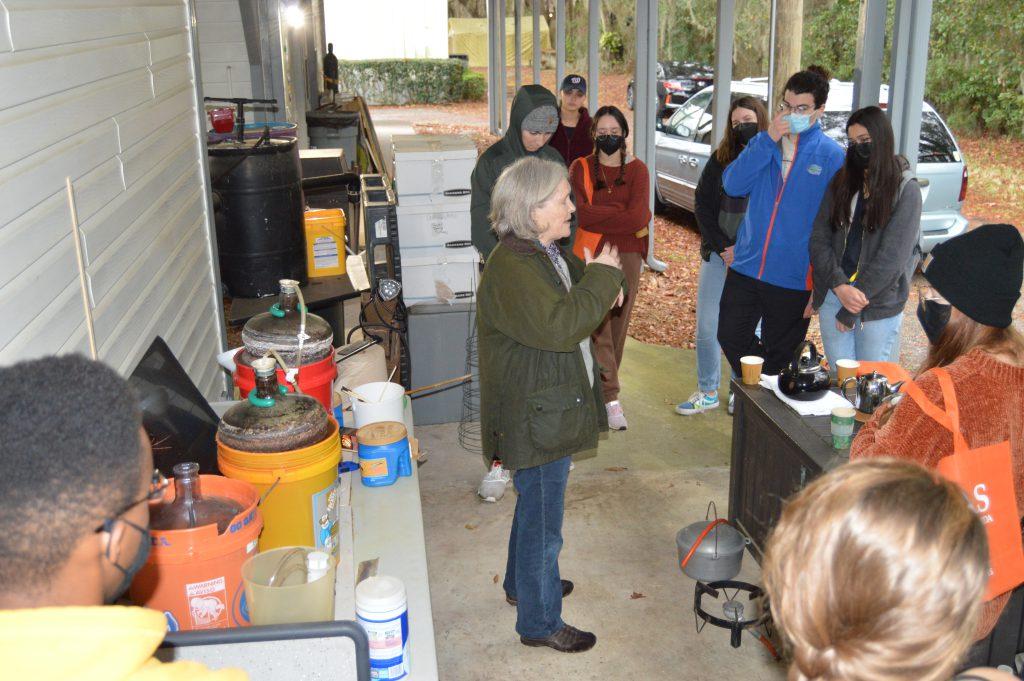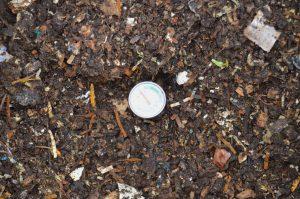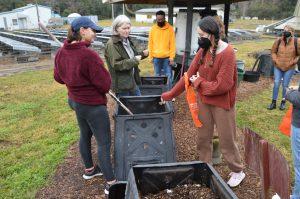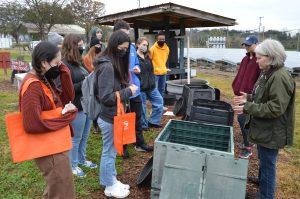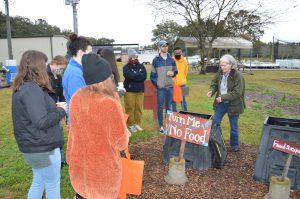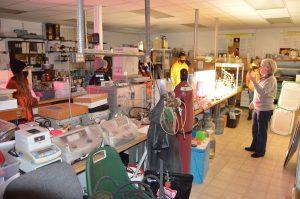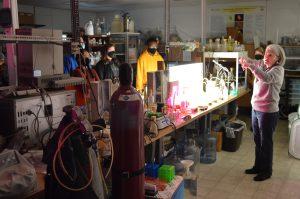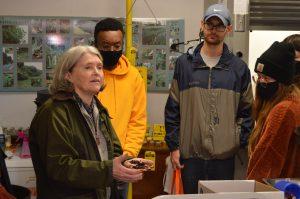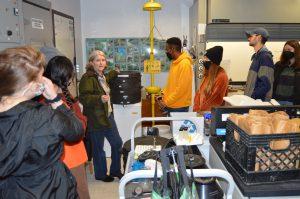About a dozen UF students filed out of a university passenger van on a chilly winter morning. The students in the environmental science lab class (EVS 3000L) came to the UF Energy Research and Education Park to learn about the Bioenergy and Sustainable Technology (BEST) Lab. Dr. Ann Wilkie, a research professor in the UF/IFAS Soil and Water Sciences Department, runs the lab. Whenever she hosts visitors, Wilkie’s goal is to get them thinking about their environmental impact. This includes their carbon footprint and ways to reduce consumption and waste.
At the BEST lab, Dr. Wilkie has assembled a diverse array of sustainable technology demonstration units and activity stations. The goal is to create a unique, hands-on learning environment. With her conversational style and natural story-telling talent, Dr. Wilkie engages the students in a participatory learning experience that exercises not just their listening, as in traditional classroom lectures, but also their visual and tactile senses. Students get to see and touch real-life experiments and technology demonstrations and become directly engaged by asking pertinent questions – thereby enhancing their learning experience.
Demonstration units at the BEST lab include biogas digesters, composters, algal cultivation, vermiculture, rainwater harvesting, food garden plots, and solar arrays.
Biodigestion
Biogas is a renewable fuel made from organic material, such as agricultural by-products, crop residues, food waste, and animal wastes. Wilkie explained how a small-scale biodigester uses an anaerobic microbial process to produce gas for energy – biogas is mostly methane, plus a liquid co-product that can be used as fertilizer.
“In developing countries, for example, where there is no electricity. Biogas use has resulted in smoke-free and ash-free kitchens, leading to improved air quality and better family health,” Wilkie explained. “It saves time compared to having to gather wood for a fire, a task largely performed by women, and benefits the environment in several ways.”
“It was very cool to get to drink tea and coffee made with energy from biogas,” said student Andrew Fishkin.
Composting
The Student Compost Cooperative (SCC), located at the BEST Lab, is an outreach and educational program that promotes sustainability at the campus and community levels. It teaches UF students about the importance of food waste composting. It also provides them an opportunity to compost their own food waste.
“I was happy to hear that some of the students have heard about microbial composting,” Wilkie said, “and that they were interested in knowing they can bring their food waste here.”
The SCC will train anyone who wants to learn about microbial composting, which turns organic waste into natural fertilizer. Students asked Wilkie about what can and cannot be put into a composter. She also explained the benefit of diverting food waste from landfills. Specifically, it reduces the liquids from food waste that turn into landfill leachate and lowers methane emissions on site.
Once the composting cycle is complete, students may use the final product to grow plants. Small garden plots are available for students to grow vegetables, herbs, and flowers. There are also pots available for students who prefer to grow one or two plants in the container garden. Additionally, rainwater is harvested to water plants in the gardens. Two large collection barrels, as well as an overflow basin, capture rainwater for later use.
Algal Cultivation
Wilkie highlighted her work on algal cultivation for the students, specifically comparing filamentous algae with microalgae. Research on the growth of algae has revealed their potential for carbon capture to reduce greenhouse gas emissions. They can also be converted into a bioenergy fuel source.
Vermiculture
More than algae and plants grow at the BEST Lab. Wilkie is also practicing vermiculture – raising and studying earthworms. The goal is to see what species is best suited for vermicomposting, which is the process of using earthworms to convert organic materials into compost.
Wilkie also spoke to the students about potential career paths in environment-related fields, sustainability and policy.
“It’s very comforting to hear that Dr. Wilkie’s career path changed from her original idea and she has been able to pursue her different passions,” student Claudia Wolfenden said.
Wilkie has mentored several undergraduate students in a myriad of research areas through the University Scholars program and those taking supervised research credits. You can see their research projects here: https://www.youtube.com/playlist?list=PLvgkamPnkczn7YtOuGu1DclMHsqqmWUC7
“The range of sustainable technologies that we have on display here serves to provide important lessons for the students,” Wilkie said. “There is no ‘one solution,’ but there are many different ways that we can be more sustainable.”
“We continue to develop our facilities to meet the goals of providing experiential learning exercises for students. We want to foster their interest in soil and water sciences, environmental and sustainability issues. Ultimately, we must look to the younger generation to lead the transition from today’s linear economy of production and disposal to a circular economy that is essential for a sustainable future.”
 4
4
